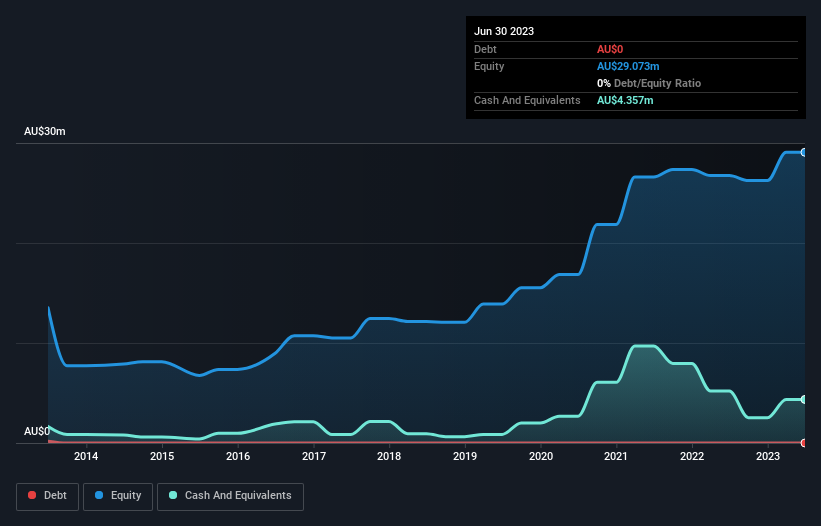- Australia
- /
- Metals and Mining
- /
- ASX:HMX
Here's Why We're Watching Hammer Metals' (ASX:HMX) Cash Burn Situation
We can readily understand why investors are attracted to unprofitable companies. For example, although Amazon.com made losses for many years after listing, if you had bought and held the shares since 1999, you would have made a fortune. But the harsh reality is that very many loss making companies burn through all their cash and go bankrupt.
Given this risk, we thought we'd take a look at whether Hammer Metals (ASX:HMX) shareholders should be worried about its cash burn. For the purpose of this article, we'll define cash burn as the amount of cash the company is spending each year to fund its growth (also called its negative free cash flow). The first step is to compare its cash burn with its cash reserves, to give us its 'cash runway'.
View our latest analysis for Hammer Metals
When Might Hammer Metals Run Out Of Money?
A cash runway is defined as the length of time it would take a company to run out of money if it kept spending at its current rate of cash burn. In June 2023, Hammer Metals had AU$4.4m in cash, and was debt-free. In the last year, its cash burn was AU$5.8m. That means it had a cash runway of around 9 months as of June 2023. That's quite a short cash runway, indicating the company must either reduce its annual cash burn or replenish its cash. You can see how its cash balance has changed over time in the image below.

How Is Hammer Metals' Cash Burn Changing Over Time?
While Hammer Metals did record statutory revenue of AU$191k over the last year, it didn't have any revenue from operations. To us, that makes it a pre-revenue company, so we'll look to its cash burn trajectory as an assessment of its cash burn situation. It's possible that the 2.1% reduction in cash burn over the last year is evidence of management tightening their belts as cash reserves deplete. Hammer Metals makes us a little nervous due to its lack of substantial operating revenue. We prefer most of the stocks on this list of stocks that analysts expect to grow.
How Easily Can Hammer Metals Raise Cash?
Even though it has reduced its cash burn recently, shareholders should still consider how easy it would be for Hammer Metals to raise more cash in the future. Companies can raise capital through either debt or equity. Commonly, a business will sell new shares in itself to raise cash and drive growth. We can compare a company's cash burn to its market capitalisation to get a sense for how many new shares a company would have to issue to fund one year's operations.
Since it has a market capitalisation of AU$38m, Hammer Metals' AU$5.8m in cash burn equates to about 15% of its market value. Given that situation, it's fair to say the company wouldn't have much trouble raising more cash for growth, but shareholders would be somewhat diluted.
Is Hammer Metals' Cash Burn A Worry?
On this analysis of Hammer Metals' cash burn, we think its cash burn relative to its market cap was reassuring, while its cash runway has us a bit worried. Summing up, we think the Hammer Metals' cash burn is a risk, based on the factors we mentioned in this article. On another note, Hammer Metals has 4 warning signs (and 2 which are potentially serious) we think you should know about.
Of course Hammer Metals may not be the best stock to buy. So you may wish to see this free collection of companies boasting high return on equity, or this list of stocks that insiders are buying.
Valuation is complex, but we're here to simplify it.
Discover if Hammer Metals might be undervalued or overvalued with our detailed analysis, featuring fair value estimates, potential risks, dividends, insider trades, and its financial condition.
Access Free AnalysisHave feedback on this article? Concerned about the content? Get in touch with us directly. Alternatively, email editorial-team (at) simplywallst.com.
This article by Simply Wall St is general in nature. We provide commentary based on historical data and analyst forecasts only using an unbiased methodology and our articles are not intended to be financial advice. It does not constitute a recommendation to buy or sell any stock, and does not take account of your objectives, or your financial situation. We aim to bring you long-term focused analysis driven by fundamental data. Note that our analysis may not factor in the latest price-sensitive company announcements or qualitative material. Simply Wall St has no position in any stocks mentioned.
About ASX:HMX
Hammer Metals
Engages in the exploration and extraction of mineral resources in Australia.
Adequate balance sheet with low risk.
Market Insights
Community Narratives




